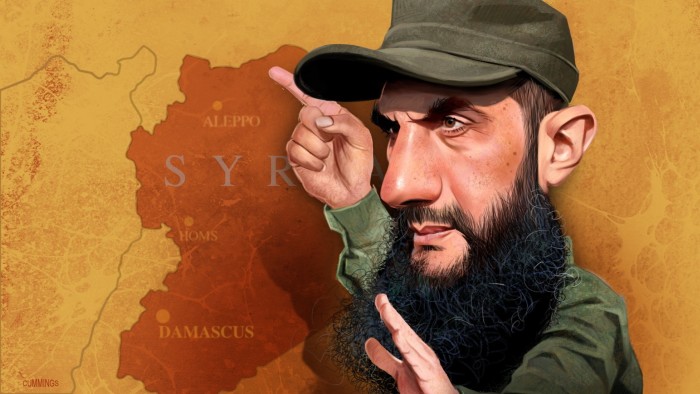Unlock the Editor’s Digest for free
Roula Khalaf, Editor of the FT, selects her favourite stories in this weekly newsletter.
Dressed head to toe in khaki and flanked by unarmed guards, Abu Mohammad al-Jolani triumphantly walked up the steps of Aleppo’s medieval citadel this week. The leader of Hayat Tahrir al-Sham (HTS) was swarmed by supporters waving flags synonymous with the rebel groups who had just captured Syria’s second city in a lightning offensive.
Jolani waved at Aleppo’s stunned residents before getting into his white jeep and driving back to the frontline. He barely cracked a smile. It was a politically astute move typical of the ambitious 42-year-old Islamist who has spent the past few years in the throes of a political transformation. Jolani regards himself as the future leader of Syria should his forces succeed in overthrowing President Bashar al-Assad’s regime.
“Jolani very smartly knows how to pick his moments, and capitalise on them,” says Aaron Zelin, an expert on jihadism, Jolani and HTS. “He picked a symbolic place, there were no guns around — it was designed to make him look like a serious, political leader.”
The appearance was the culmination of a weeklong offensive by HTS-led rebels, one of the most shocking moments in Syria’s bloody 13-year civil war and a stunning reversal in a conflict whose frontline has been frozen in an uneasy stalemate.
Days after seizing Aleppo, rebels captured another major city, Hama, and were soon barrelling southwards towards Homs. Damascus — the capital that Jolani has long had in his sights — could be next.
The success of the offensive underscores the fragility of Assad’s hold over his shattered country. His armed forces — despite being propped up by Russia, Iran and Tehran’s network of proxies — appeared to melt away as the rebels advanced.
It was also the product of years of careful preparation by Jolani, who helped his group rebound from near-collapse five years ago. He has moderated its Islamist doctrine, built out its military capabilities and established a civilian-led government.
That transformation was on display during the offensive. Jolani capitalised on the recent outreach he’d conducted with tribes, former opponents and minority groups, brokering surrenders and ordering the protection of minorities. He even directed a statement to Russia, which has helped Assad for years, suggesting HTS and Moscow could find common ground in rebuilding Syria.
Born Ahmed Hussein al-Sharaa in 1982, Jolani spent his first seven years in Saudi Arabia, where his father was working as an oil engineer. He then moved to Damascus — the city his grandfather arrived in following Israel’s occupation of Syria’s Golan Heights.
Jolani has said he was radicalised by the second intifada in 2000. “I was 17 or 18 years old at the time, and I started thinking about how I could fulfil my duties, defending a people who are oppressed by occupiers and invaders,” he told PBS Frontline in 2021, in one of his only interviews with western media to date.
Drawn to resist the US invasion of Iraq in 2003, he landed in Baghdad after a long bus ride from Damascus just a few weeks before US forces did. He spent the next few years rising through the ranks of the insurgency before being captured and thrown into Camp Bucca prison, now notorious for incubating a generation of jihadi leaders.
Released just as the Syrian uprising began in 2011, Jolani crossed the border with bags full of cash and a mission to expand al-Qaeda. Many in Iraq were happy to see him go. He was at odds with al-Qaeda’s leaders there, a rivalry that continued to grow. Jolani distanced himself from their transnational jihadi ideology and grew his rebel faction under the auspices of a nationalist struggle for Syria. Eventually he broke away and openly fought against al-Qaeda and Isis.
He has also purged the more radical elements of HTS and helped to craft a technocratic administration. “Jolani’s destiny is being written right now. Just how he manages the next phase, if HTS manages to remain inclusive, that will determine what his legacy will be,” says Jerome Drevon, a jihad expert at the Crisis Group think-tank.
Jolani stands out among his peers. He is well-educated, urbane and softly-spoken. His middle-class background “helped shape his approach to Islam”, says Drevon. “He often says that the real world has to guide your Islam, that you cannot force your Islam on to the real world.”
But jihadism expert Zelin cautions that this doesn’t make Jolani a liberal democrat, describing him as “the charismatic leader of an authoritarian regime”.
This has been key to his success. So have his coterie of young advisers. “They are very well-educated people who understand the outside world. They don’t have a bunker mentality,” says Dareen Khalifa, Drevon’s colleague at Crisis Group, who has met Jolani repeatedly since 2019.
The question is how far can the transformation go? The US has designated HTS a terrorist organisation and placed a $10mn bounty on Jolani’s head — which could complicate his aspirations to build relationships with the west and lead Syria.
This week, Jolani told Khalifa that his group would consider dissolving itself, that Aleppo would be managed by a transitional body and the city’s social fabric and diversity would be respected. Whether the group can reconcile this plan with its jihadi roots remains to be seen.
raya.jalabi@ft.com
Read the full article here




